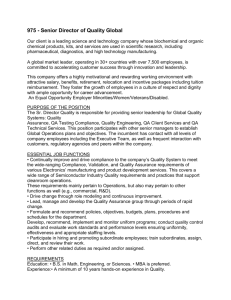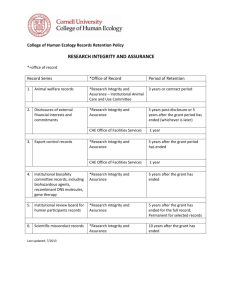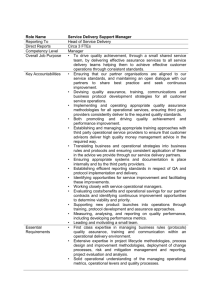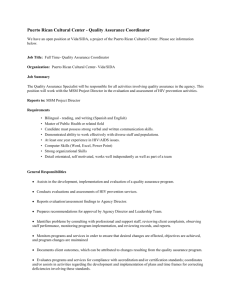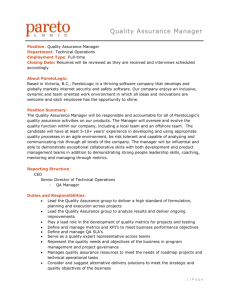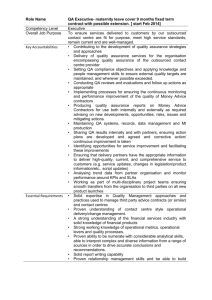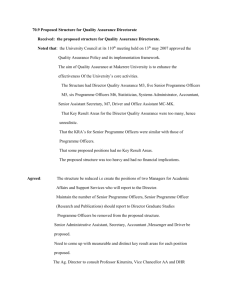Paper - WIGUT
advertisement
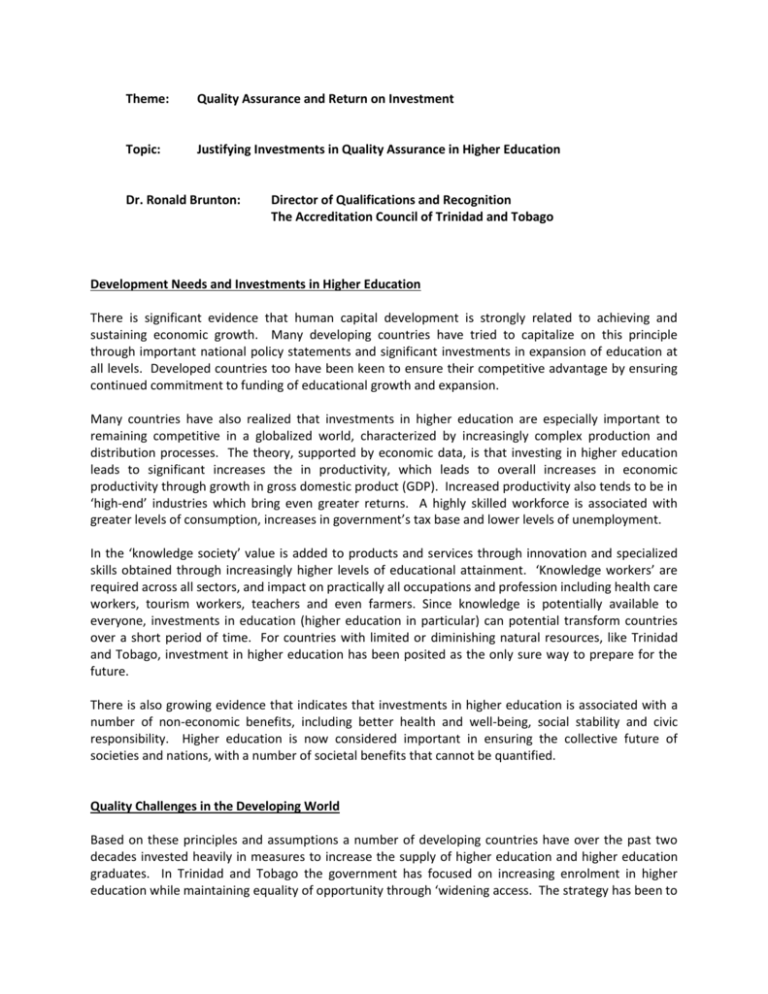
Theme: Quality Assurance and Return on Investment Topic: Justifying Investments in Quality Assurance in Higher Education Dr. Ronald Brunton: Director of Qualifications and Recognition The Accreditation Council of Trinidad and Tobago Development Needs and Investments in Higher Education There is significant evidence that human capital development is strongly related to achieving and sustaining economic growth. Many developing countries have tried to capitalize on this principle through important national policy statements and significant investments in expansion of education at all levels. Developed countries too have been keen to ensure their competitive advantage by ensuring continued commitment to funding of educational growth and expansion. Many countries have also realized that investments in higher education are especially important to remaining competitive in a globalized world, characterized by increasingly complex production and distribution processes. The theory, supported by economic data, is that investing in higher education leads to significant increases the in productivity, which leads to overall increases in economic productivity through growth in gross domestic product (GDP). Increased productivity also tends to be in ‘high-end’ industries which bring even greater returns. A highly skilled workforce is associated with greater levels of consumption, increases in government’s tax base and lower levels of unemployment. In the ‘knowledge society’ value is added to products and services through innovation and specialized skills obtained through increasingly higher levels of educational attainment. ‘Knowledge workers’ are required across all sectors, and impact on practically all occupations and profession including health care workers, tourism workers, teachers and even farmers. Since knowledge is potentially available to everyone, investments in education (higher education in particular) can potential transform countries over a short period of time. For countries with limited or diminishing natural resources, like Trinidad and Tobago, investment in higher education has been posited as the only sure way to prepare for the future. There is also growing evidence that indicates that investments in higher education is associated with a number of non-economic benefits, including better health and well-being, social stability and civic responsibility. Higher education is now considered important in ensuring the collective future of societies and nations, with a number of societal benefits that cannot be quantified. Quality Challenges in the Developing World Based on these principles and assumptions a number of developing countries have over the past two decades invested heavily in measures to increase the supply of higher education and higher education graduates. In Trinidad and Tobago the government has focused on increasing enrolment in higher education while maintaining equality of opportunity through ‘widening access. The strategy has been to support both public as well as private sector institutions mainly through tuition waivers and access to student loans. There have also been increases in government scholarships to attend local institutions, but also for study in specialized areas at ‘top’ foreign institutions. Rapid growth in enrolments during the past decade, the proliferation of private provision of higher education, demands for greater accountability and complaints from employers concerning the ‘skill-gap’ of higher education graduates, have combined to raise serious concerns about the quality of higher education. It is becoming increasingly apparent that the ‘massification’ of higher education can erode the confidence in the quality of higher education graduates, undermining the benefits of investments in higher education. In order to stem the decline in the perceived quality of higher education, effective quality assurance and quality improvement needs to be implemented at the institutional and national level. Several factors can potentially lead to the decline in quality of higher education. These include, lower per unit costs to produce a graduate, insufficient numbers of qualified academic staff in higher education institutions (possibly magnified by brain drain, retirements or migration due to fear of crime), low internal and external efficiency, and poor governance. Added to this, the rapid growth of private providers, foreign programmes and distance learning in response to the increasing demand for higher education, have raised questions about the integrity of higher education investments. In response, institutions and governments have had to put in place various forms of quality assurance to reverse the decline in quality and to regulate the new providers. Challenges of Implementing Quality Assurance Systems The need for effective quality assurance mechanisms is becoming a priority of many national strategies for higher education. Throughout Latin America and the Caribbean, Asia, Africa and Europe national accrediting bodies and regional quality assurance initiates are being established to ensure institutions maintain minimum quality standards. It is becoming increasingly the norm that higher education standards are based on international best practice; and that regional quality assurance associations/bodies play a role in coordinating the activities and capacity building of national quality assurance agencies. At the institutional level, increasing demand for accountability by governments, employers and the public, as well as the growing need to compete on a national and international level has led to growing emphasis on investing in quality assurance mechanisms and quality audits. Institutions have come to realize the importance of self assessment as part of the quality assurance process. Self assessment promotes a ‘culture of quality’ within the institution and units involved. Selfassessment also facilitates teamwork among staff and helps institutions to identify their strengths and weaknesses. Similar constraints and challenges face both institutions and national agencies in implementing effective systems for quality assurance. Insufficient numbers of adequately trained and credible professional staff to manage quality assurance processes is a significant challenge, particularly for newly established quality assurance agencies. Inadequate numbers of academic staff at higher education institutions with knowledge and experience in conducting self-evaluations can significantly limit the depth of self assessments by institutions preparing for external evaluation. This is particularly the case as institutions, especially private institutions, move towards a greater reliance on part-time and adjunct staff. National quality agencies also depend on a limited supply senior academic staff and professionals to act as external evaluators at institutional and programme reviews. There is an obvious strain on senior academics as they are asked to support both their own internal quality assurance systems as well as the national agencies. Justifying Investments in Quality Assurance Quality assurance can be expensive, require the time and commitment of highly-skilled individuals and necessitate significant administrative support and coordination. The benefits of quality assurance can be difficult to quantify or separate from the regular goals of what the institution is supposed to achieve. Justifying investments in quality assurance mechanism at higher education institutions is about demonstrating the value added through such investments. Quality assurance systems must be seen as leading to quality outputs and processes in terms of ‘fitness for purpose’. Quality assurance initiatives must also be seen as long term and genuine efforts towards improvement; not simply temporary systems set up to meet the minimum standards of external regulators. To be effective, quality assurance initiatives must harness the support of staff at various levels of the institution; from the gardener and cleaner, to administrative and academic staff (many who are likely disagree on vital issues). To be effective, the benefits of investments in quality assurance must also be clearly communicated to and supported by a broad range of stakeholders. A successful quality assurance system must be linked to the achievement of the learning outcomes (knowledge, skills and competence achieved at the end of the learning process) that fulfil key stakeholders’ expectations, including; students, parents, employers and the public in general. In terms of students’ interests, quality assurance systems must lead to student-centred teaching and learning process, as well as innovative and flexible learning programmes that meet their expectations and lead to professional development and increased employability. Quality higher education produces graduates who can enter the workforce ready to add value. Quality higher education should also satisfy employers’ demands for skilled professionals who possess core skills and knowledge, as well as the inclination to seek further professional development. Quality assurance also leads to greater public confidence in institutions. The requirements of quality assurance reporting and documentation can lead to greater confidence in the transparency and accountability of higher education institutions, particularly publicly funded institutions. Greater public confidence in higher education institutions goes a long way in justifying further investment. In an increasingly globalized world quality assurance is critical in maintaining international recognition and competitive advantage. Faced with growing competition from cross border education and distance learning programmes accessible to students around the world, ‘borderless’ education can pose a significant threat to local institutions that are unable to produce internationally competitive programmes. At the national level, countries that fail to develop high quality, internationally recognised institutions have significant difficulties in attracting foreign investment. Multinational corporations unable to find local talent in the countries they operate are likely to bring their own professionals, and seek particularly exploitative economic relationships. REFERENCES Bacchus, M.K. 1992. “Meeting Higher Education Needs of Small States: Financial and Management Implications”. Prepared for The Conference on Higher Education in Small Nation-States. The World Bank. Blaug, Mark. 1987. The Economics of Education and the Education of an Economist. New York: New York University Press. Department of Education, Training amd Youth Affairs. 2000. The Australian Higher Education Quality Assurance Framework. Commonwealth of Australia. Kis, Viktoria. 2005. “Quality Assurance in Tertiary Education: Current Practices in OECD Countries and a Literature Review on Potential Effects”. OECD Thematic Review of Tertiary Education. OECD, 20005. Materu, Peter. 2007. “Higher Education Quality assurance in Sub-Sarahan Africa: Status, Challenges, Opportunities and Promising Practices”. World Bank Working Paper No. 124. The World Bank. Robotham, Don. 2000. "Changing a University: Reconciling Quantity with Quality - The Case of the University of the West Indies. "Access to Tertiary education in the Commonwealth Caribbean in the 1990's". In Higher Education in the Caribbean: Past, Present and Future Directions. Edited by Glenford D. Howe. The University of the West Indies Press. Mona: Jamaica. UNESCOPublishing. 2002. Financing Education- Investments and returns: Analysis of the World Education Indicators. Paris, France: UNESCOPublishing. Young, Gill and Marks-Maran, Di. 1998. "Using Constructivism to Develop a Quality Framework for Learner Support: A Case Study". Open Learning. Vol. 13, No. 2: 30-37. Ronald Brunton Ph.D. Director, Qualifications and Recognition Accreditation Council of Trinidad and Tobago Level 3, Building B, ALGICO Plaza 91-93 St Vincent Street PORT OF SPAIN Tel: 1-(868)-623-2500 Fax: 1-(868)-624-5711 rbrunton@actt.org.tt
